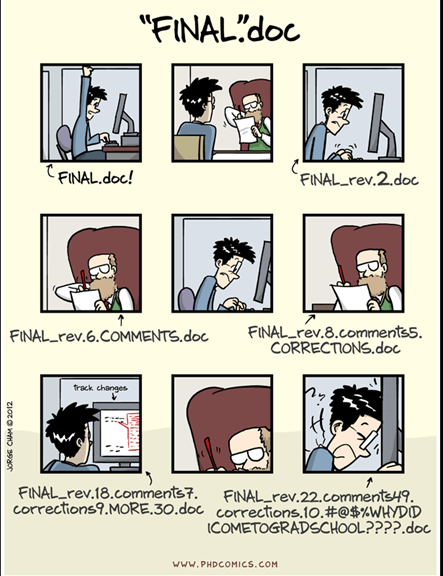by Jonathan Faerber

Many of us worry about our writing. We are apprehensive about an unfamiliar topic, or we are afraid of what others will think of our work. We anticipate getting things wrong. We exaggerate criticism and fear failure. We are overwhelmed by uncertainty and obsess over details that are outside of our control.
When I worked as a writing tutor and graduate student at UVic, I often lived in denial of these fears. I like writing, I told myself. I enjoy it. But all too often, I found myself making excuses not to write: I had other work to do, or I needed to finish a few more books before completing a thesis chapter. I struggled to be honest with myself, but these were symptoms of a simple problem: I was terrified of my thesis.
Anxiety like this is a natural emotion. It is characterized by uneasiness, tension, and pessimism. The causes of anxiety are somewhat subjective, but there are some common patterns. Anxiety is often preceded by negative events followed by an expectation of continued difficulty or future disaster.
Fortunately, there are therapeutic activities and treatments for anxiety, and if writing anxiety is a special case of such worry, similar strategies can help writers as well. For example, psychologists often treat anxiety disorders with cognitive behavioural therapy or exposure therapy. CBT involves identifying our negative thoughts and focusing on positive or realistic thinking instead, while exposure therapy is a way to progressively familiarize ourselves with what worries us.
Similarly, it helps to be honest about our writing anxiety and to spend time getting comfortable with the writing process. For example, consider that writing assignment that you dread. Perhaps it is for a demanding instructor or it is on a subject or topic you do not like. Or perhaps the sheer amount of work you still have left is overwhelming. It is all too easy to push these thoughts into the back of our minds and turn to Netflix or Facebook and focus our attention elsewhere.
But this won’t help for long. We can’t ignore what we are afraid of forever. And in my experience, I can’t really forget about writing that I have to do unless I am writing. It was only in this honesty that I’d realize that my worries were often exaggerated.
So the solution here is to write. Of course, this is easier said than done. But it is important to write even when we feel that we cannot or do not want to. The more we write, the less writing will worry us. It does not matter exactly what writing you do, as long as you write. With that in mind, here are three suggestions that helped make my writing experiences more positive—even therapeutic.
First: try to focus on what you can control. We often are so preoccupied with the end product that we will not put pen to paper until we think we have the end product in sight. But that is never how writing works. The only way to know what you will write is to write. Do not obsess over what is outside your control. Do not obsess over the end product before the end. Set yourself achievable goals. Focus on the next step—the one you can complete right now: whether this is one paragraph, or one page, or one section, or one chapter. Either way, the only way to accomplish anything is through incremental steps. Do what you can. You can’t do what you can’t, so don’t worry in advance about what you haven’t managed yet.
Second: make yourself vulnerable. Let others know what your worries are. Talk to people. Write with people. Share your writing with readers who aren’t grading you. There are many people who can help you and who will read your writing for the sake of helping you. This might be a close friend or a classmate. It might be someone at the Centre for Academic Communication.
Again, we all worry about writing. All the time. You are normal. You are not alone.
But then, there are times where being alone will help. Too often, we think writing is just for school or work, and we are often trained to think we are wasting time unless we are writing for someone or to accomplish something, and then we wind up getting nothing done. So my third suggestion is write things you don’t have to write. Sometimes, these can turn into parts of papers that you have to write. After all, it is hard to like what you write if you don’t like writing it. So remember to make time to write for you. You don’t always have to write. But don’t write only what you have to write. Remember to make time to write for you.
Of course, I cannot guarantee that following this advice will make your anxiety go away, but it might help you diagnose and understand its causes. The good news is that once we better understand our anxiety, we can predict or expect it. We can reduce it. We can manage it. But it may be unrealistic to think that we can eliminate anxiety altogether.
After all, anxiety is a difficult problem. But I think almost any solution to it will involve a conversation. This blog post is my contribution to this conversation and an invitation for you to face up to your worries in your own writing as well.
Jonathan is a UVic alumnus and former tutor at the Centre for Academic Communication. He is currently Writing Centre Associate at Royal Roads University.

